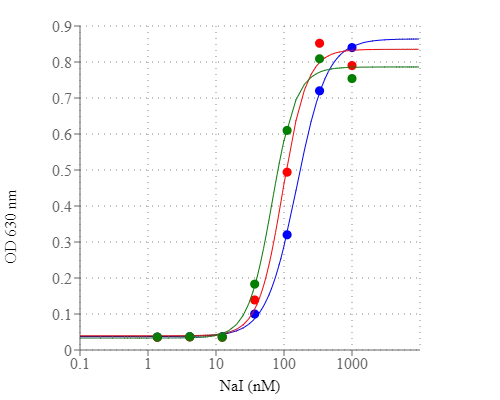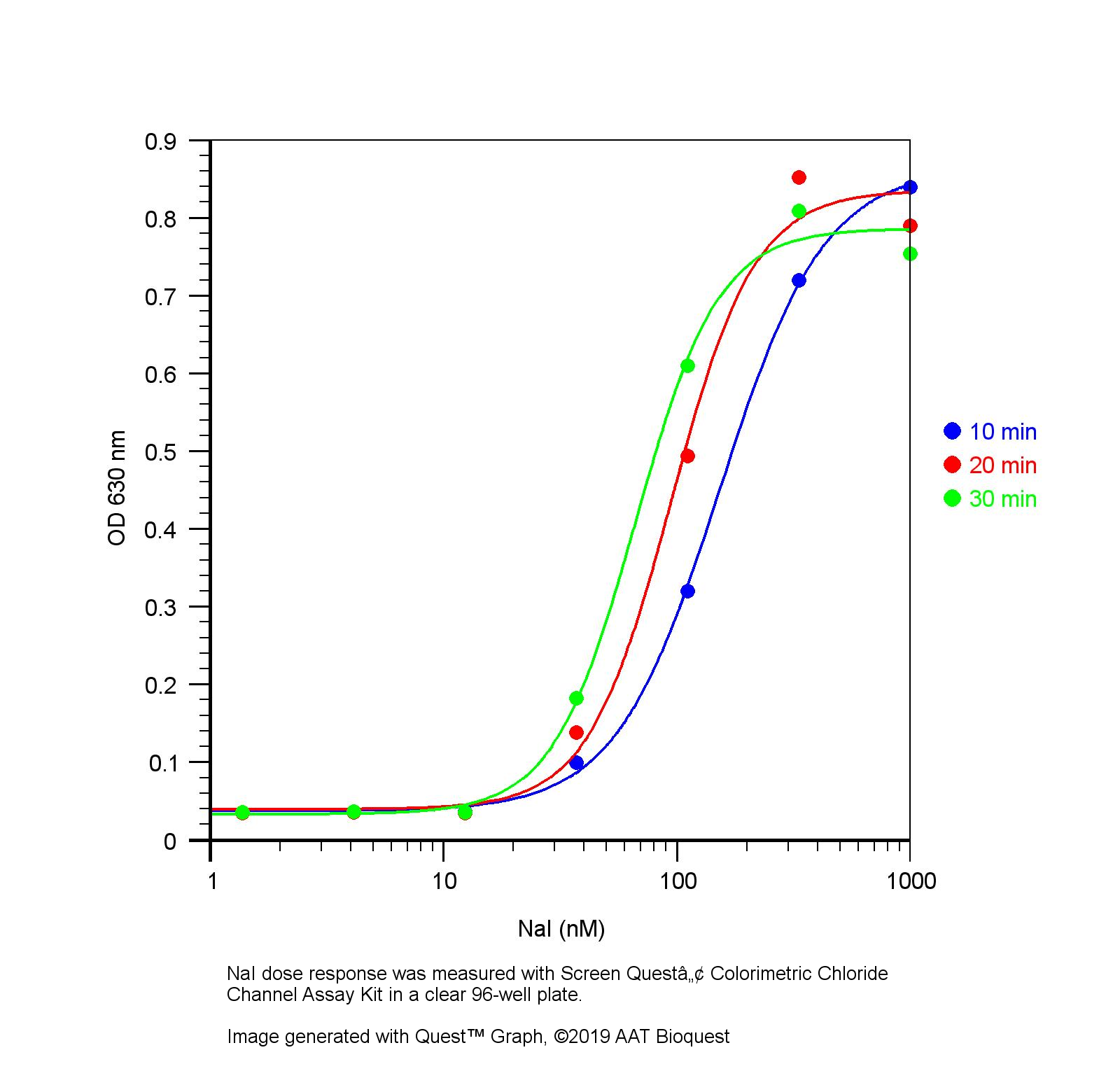上海金畔生物科技有限公司代理AAT Bioquest荧光染料全线产品,欢迎访问AAT Bioquest荧光染料官网了解更多信息。
Screen Quest 比色法氯离子通道检测试剂盒价格 10753
产品规格
产品货号

| Ex (nm) | – | Em (nm) | – |
| 分子量 | – | 溶剂 | – |
| 存储条件 | – |
氯离子通道具有多种重要的生理和细胞功能,包括调节pH值,体内稳态,有机溶质转运,细胞迁移,细胞增殖和分化。氯离子通道代表了有价值的药物靶标。许多慢性疾病状态,例如囊性纤维化和Bartter综合征,是由于氯化物通道功能的缺陷所致。Screen Quest 比色氯通道测定试剂盒为研究氯离子通道提供了灵敏而稳定的比色方法。该测定法基于我们专有的碘化物指示剂(Iodide Blue ),用于测量碘化物浓度,该测定法检测到的碘化物低至30 nM。 Screen Quest 氯离子通道测定试剂盒提供了一种用于检测氯离子通道的优化测定方法。该测定可以使用96孔或384孔微孔板进行,并易于适应自动化。金畔生物是AAT Bioquest的中国代理商,为您提供优质的Screen Quest 比色法氯离子通道检测试剂盒。
适用仪器
| 光吸收酶标仪 | |
| 吸收: | 630, 380, or 405nm |
| 推荐孔板: | 透明底板 |
样品实验方案
简要概述
- 准备细胞
- 除去生长培养基
- 加入I-Loading Buffer,用筛选化合物处理细胞
- 用DPBS缓冲液洗涤细胞3次
- 用1X裂解液裂解细胞
- 添加等体积的I-sensor(50或25 µL)
- 将0.1X加到I- Sensor Enhancer(50或25 µL)
- 在室温下孵育10秒至10分钟
- 检测380 nm,405 nm或630 nm处的吸光度
溶液配制
储备溶液配制
细胞裂解缓冲液(1X):将整个小瓶的10X细胞裂解缓冲液(组分D)添加到45 mL无菌H2O中,并充分混合。 注意:5 mL 1X细胞裂解缓冲液足以装满一块板。 将未使用的1X细胞裂解缓冲液储存在4℃。
工作溶液配制
I- Sensor Enhancer工作溶液(1X):将50 µL 100X碘化物增强指示剂(组分B)加入5 mL无菌H2O中并充分混合。 注意:1X I- Sensor Enhancer工作溶液不稳定,请稀释后2小时内使用。 注意:应单独评估每个细胞系,以确定I-Sensor Enhancer溶液的稀释度。 我们观察到0.1X I-Sensor Enhancer工作溶液在某些细胞系中效果更好。
实验步骤
1.碘化物流出测定
1.1从细胞板上吸出生长培养基。
1.2加入100 µL /孔(96孔板)或25 µL /孔(384孔板)的预热I-上样缓冲液(组分C)并孵育2-4小时。
1.3完全吸出碘化物上样缓冲液。 用DPBS或HBSS清洗细胞至少3次。
1.4在HBSS缓冲液中用激动剂处理细胞5分钟。 注意:为筛选拮抗剂,将化合物与I上样缓冲液孵育至少30分钟,然后再用DPBS或HBSS缓冲液洗涤细胞。
1.5吸出上清液。
1.6通过添加50 µL /孔(96孔板)或25 µL /孔(384孔板)的1X细胞裂解缓冲液来裂解细胞。
1.7进行碘化物测定。
2.用于碘化物流入分析
2.1从细胞板上吸出生长培养基。
2.2加入预热的I-上样缓冲液(组分C)和测试化合物100 µL /孔(96孔板)或25 µL /孔(384孔板)并孵育5分钟。
2.3完全吸出碘化物上样缓冲液。 用HBSS洗涤细胞3次。
2.4通过添加50 µL /孔(96孔板)或25 µL /孔(384孔板)的1X细胞裂解缓冲液来裂解细胞。
2.5进行碘化物测定。
3.运行碘化物测定
3.1从碘化物流入/流出测定选择的孔中添加50 µL /孔(96孔板)或25 µL /孔(384孔板)的Iodide Blue 指示剂(组分A)。
3.2向混合物中加入50 µL /孔(96孔板)或25 µL /孔(384孔板)的1X碘化物指示剂增强剂溶液。 注意:对于某些细胞系,您可能需要将增强剂溶液稀释至0.1X。
3.3在室温下孵育10秒-10分钟。 注意:应单独评估每个细胞系,以确定孵育时间。 注意:由于存在高浓度的碘化物,蓝色可能在数秒至数分钟内变为黄色。
3.4检测630、380或405 nm处的吸光度。
图示
 图1. NaI剂量反应是在透明的96孔板上用Screen Quest 比色氯通道测定试剂盒测量的。 |
参考文献
A tyramine-gated chloride channel coordinates distinct motor programs of a Caenorhabditis elegans escape response
Authors: Pirri JK, McPherson AD, Donnelly JL, Francis MM, Alkema MJ.
Journal: Neuron (2009): 526
ANO2 is the cilial calcium-activated chloride channel that may mediate olfactory amplification
Authors: Stephan AB, Shum EY, Hirsh S, Cygnar KD, Reisert J, Zhao H.
Journal: Proc Natl Acad Sci U S A (2009): 11776
Activation of a chloride channel by a trophic ligand is required for development of the mouse preimplantation embryo in vitro
Authors: Li Y, O’Neill C, Day ML.
Journal: Biol Reprod (2009): 759
An ivermectin-sensitive glutamate-gated chloride channel from the parasitic nematode Haemonchus contortus
Authors: McCavera S, Rogers AT, Yates DM, Woods DJ, Wolstenholme AJ.
Journal: Mol Pharmacol (2009): 1347
Chloride intracellular channel 1 regulates osteoblast differentiation
Authors: Yang JY, Jung JY, Cho SW, Choi HJ, Kim SW, Kim SY, Kim HJ, Jang CH, Lee MG, Han J, Shin CS.
Journal: Bone (2009): 1175
Chloride intracellular channel protein-4 functions in angiogenesis by supporting acidification of vacuoles along the intracellular tubulogenic pathway
Authors: Ulmasov B, Bruno J, Gordon N, Hartnett ME, Edwards JC.
Journal: Am J Pathol (2009): 1084
Chloride intracellular channel-4 is a determinant of native collateral formation in skeletal muscle and brain
Authors: Chalothorn D, Zhang H, Smith JE, Edwards JC, Faber JE.
Journal: Circ Res (2009): 89
Cloning, expression, and characterization of stable manganese superoxide dismutase from ascus aurantiacus var. levisporus
Authors: Song NN, Zheng Y, E SJ, Li DC.
Journal: J Microbiol (2009): 123
Effects of Chinese herbal medicine combined with He-Ne laser on lipoperoxide and superoxide dismutase in chloasma patients
Authors: Wu YH, Li QL, Yang XW.
Journal: J Tradit Chin Med (2009): 163
Genetically encoded optical sensors for monitoring of intracellular chloride and chloride-selective channel activity
Authors: Bregestovski P, Waseem T, Mukhtarov M.
Journal: Front Mol Neurosci (2009): 15
